The Struggle of Post-Pregnancy Body Image
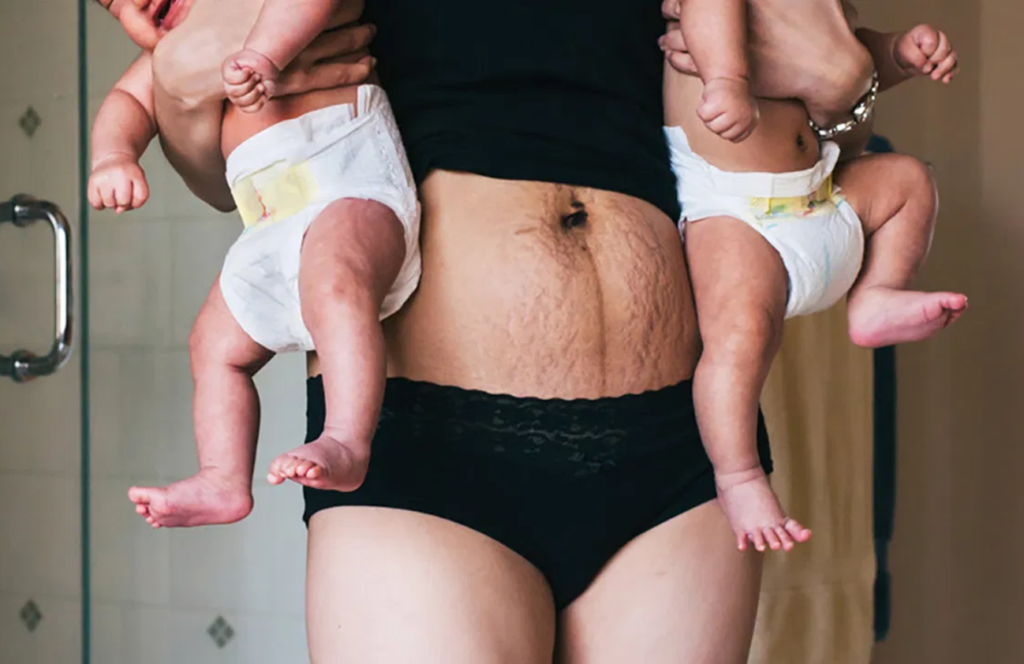
Are you pregnant and struggling with the changes to your growing body? Or maybe you’ve recently had a baby and, instead of feeling blissful, are overcome with negative emotions about your post-pregnancy body? You’re not alone. Studies have shown that many women struggle with negative postpartum body image after giving birth — even many years later.
Of course, we aren’t surprised by this. We live in a society that promotes, expects and celebrates the perfect female body… but those idealistic expectations and pursuits can persist even after a woman has a baby. From all the “perfect images” of new moms on social media to unrealistic movie and television portrayals of postpartum women to slimmed down pics of our favorite celebs in gossip mags mere weeks after they gave birth, women are literally inundated with messages about the importance (and ease?) of “bouncing back after baby.”
I remember just a few weeks after giving birth to my firstborn, I was flipping through a People magazine and saw an article praising a female celebrity for being back to her pre-baby body weight shortly after giving birth, and I felt instantly defeated.
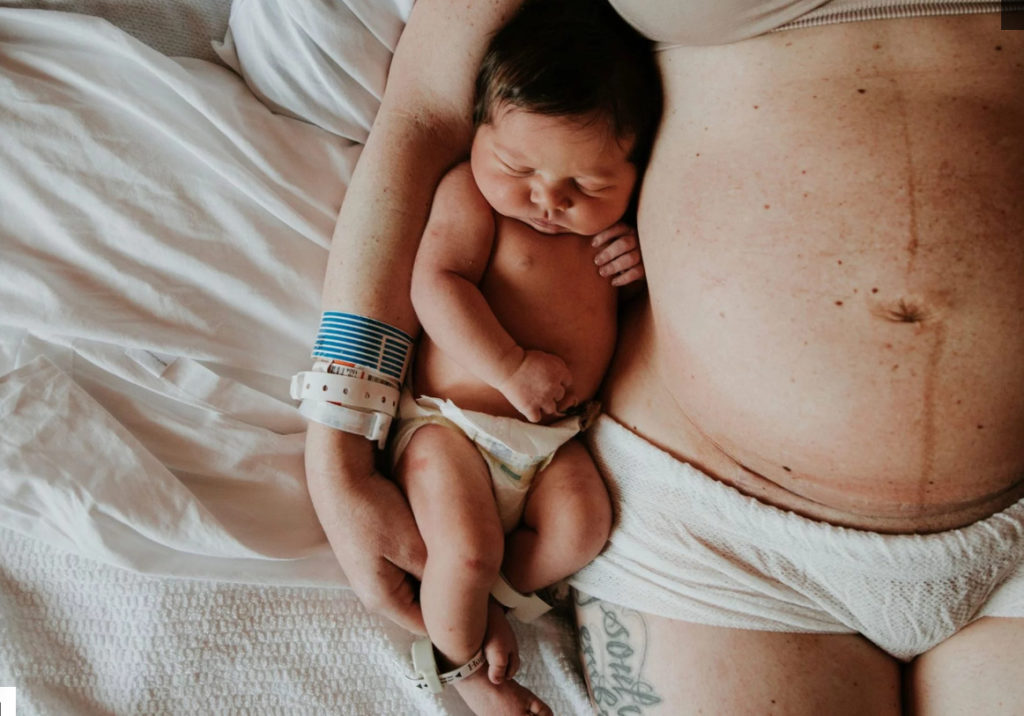
Not only was I nowhere near looking like I did before pregnancy, but I was also completely sleep deprived and constantly tending to and nursing my fussy newborn… I couldn’t fathom getting off the couch, let alone working out. Not to mention, when I looked down at my body, all I could see was a poochy belly with excess, saggy skin, stretch marks and newfound skin problems (hello, adult acne!).
Simply put, my body felt so foreign and odd. I didn’t recognize myself.
The reality is pregnancy changes our bodies (and brains!) in a variety of ways, and having realistic expectations about that is important. Our skin stretches, some of us (myself included) experience abdominal muscle separation (diastasis recti), our hips widen, our bones get bigger, our breasts change density and shape, our feet grow (!!)… Shall I go on?
And though this is all supposed to happen — our bodies have to expand and shift in profound ways to develop, make room for and grow another human — many of us can’t help but feel frustrated, insecure and even ashamed about the way our bodies look after we give birth.
“Ask any new mom who’s been there and they will verify that this stage is a tough one, filled with endless self-doubt… It’s so hard to be in this place of wanting to feel confident, wanting to regain some sort of control in your newly out-of-control existence, only to feel like a frumpy version of your once-fabulous self.”
~ Carla Korn, LMFT, a therapist who specializes in eating disorders and body image (find her blog here)
Becoming a mom, like any transition in life, can be hard on the body and the mind. The postpartum period comes with so many unknowns, and it may feel like you don’t have any control over your body (and perhaps in your new role as a mom), but please try to remember: you have the power to make a healthy shift in your mindset and life.
In this article, we’ll address some of the root causes of negative postpartum body image, as well as offer tips to help you feel better right now. Whether you believe it or not, your body doesn’t need to conform to unrealistic standards — it is amazing and beautiful and unique, and we want to help you learn to accept, honor and love it.
Contributors to Postpartum Body Shame
Media & Cultural Expectations
We are constantly being bombarded by cultural expectations of how our bodies should look. Take a second to scroll through your social media feed, peruse any pop culture website or magazine, or think about all the products that exist to help you “lose weight quickly.” Society places an insane emphasis on thinness and physical appearance — the “perfect body.”
Of course, everyone knows a woman must gain weight in order to grow a healthy baby, so expectant women are exempt from the expectation of thinness. But, sadly, that respite doesn’t last long after the baby is born. Indeed, we’re somehow led to believe that we should be able to quickly lose the baby weight and fit back into our pre-pregnancy wardrobe.
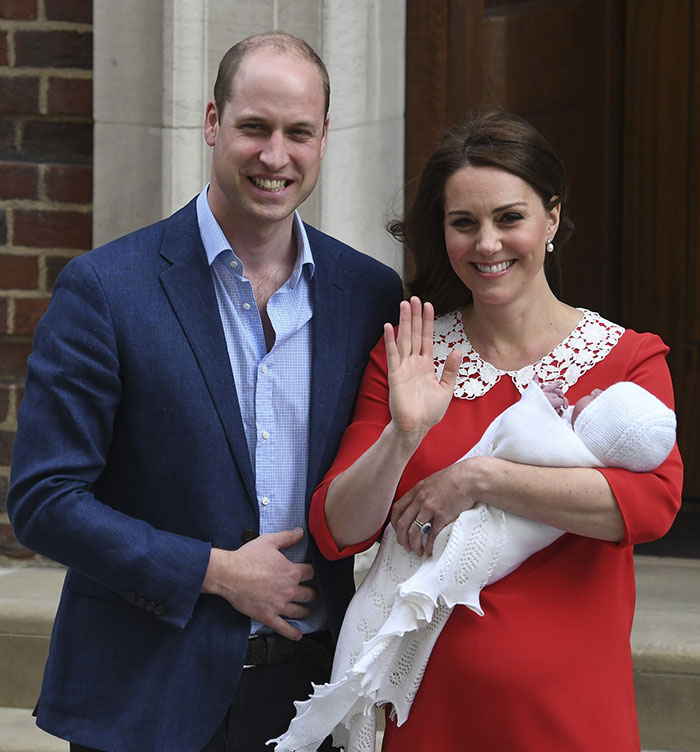
This message is unrealistic, highly damaging and outright dangerous, as it leads so many new moms to feel like failures (how can we not do this thing we are supposed to do? Losing the baby weight should be simple! All the celeb moms can do it…) and like “less than” versions of their former selves. For some new moms, it can trigger deep feelings of disgust and self-loathing every time they look in the mirror, and, in certain circumstances, may also lead to postpartum depression.
“If you’re struggling to accept what you see reflected in the mirror, understand that that [feeling] is not your fault. Acknowledge that you’ve likely grown up in a culture that values women primarily for aesthetics and has very narrow ideas about female appearance… At a time when the focus should really be on health and the major adjustment ahead, society adds this layer of self-consciousness to all that you’re already managing.”
~ Kate Borsato, RCC, a therapist who specializes in helping new moms transition to motherhood
Feelings of Insecurity, Loss and Uncertainty in Transition to New Motherhood
The negative feelings you may experience about your postpartum body could be about more than just your physical appearance. The loss of a woman’s pre-baby body (the body you’ve gotten used to and known since becoming a woman) is tangible, visible evidence (and a reminder) that her life and identity has changed significantly, and that can feel incredibly scary, isolating and overwhelming.
According to the NYT, the body is symbolic. “For many new mothers, a struggle with body image is intertwined with the desire to reclaim parts of themselves that have been pushed aside by the physical and emotional demands of new parenthood. Have compassion for yourself as you go through this identity transition, and be as gentle with your own body as you are with your baby’s.”
Many new moms, myself included, struggle with this transition to new motherhood. As therapist Michelle Malloy, explains, the many changes women face after having a baby can “hit like a ton of bricks.” I remember crying hysterically after my first was born because my husband abruptly stopped calling me “hottie” — the nickname he’d given me the day we met — and started calling me “mommy” instead. It made me feel like he no longer saw me as sexy or desirable, and instead, my identity was now only that of “mom.”
More often than not, a baby can change your relationship with your partner. You may feel less romantic, more resentful (especially if you’re the one consistently getting up in the middle of the night with the baby… ), and less connected emotionally and physically.
There’s also the loss in autonomy and independence. After a baby arrives, a woman’s time doesn’t truly belong to her anymore (her baby’s schedule likely dictates her own!). Not to mention the major changes (often losses) many women experience in their careers.
History of Disordered Eating and Distorted Body Image
Michelle also says that a strong predictor of negative body image after pregnancy is negative body image before pregnancy, as well as a history of disordered eating.
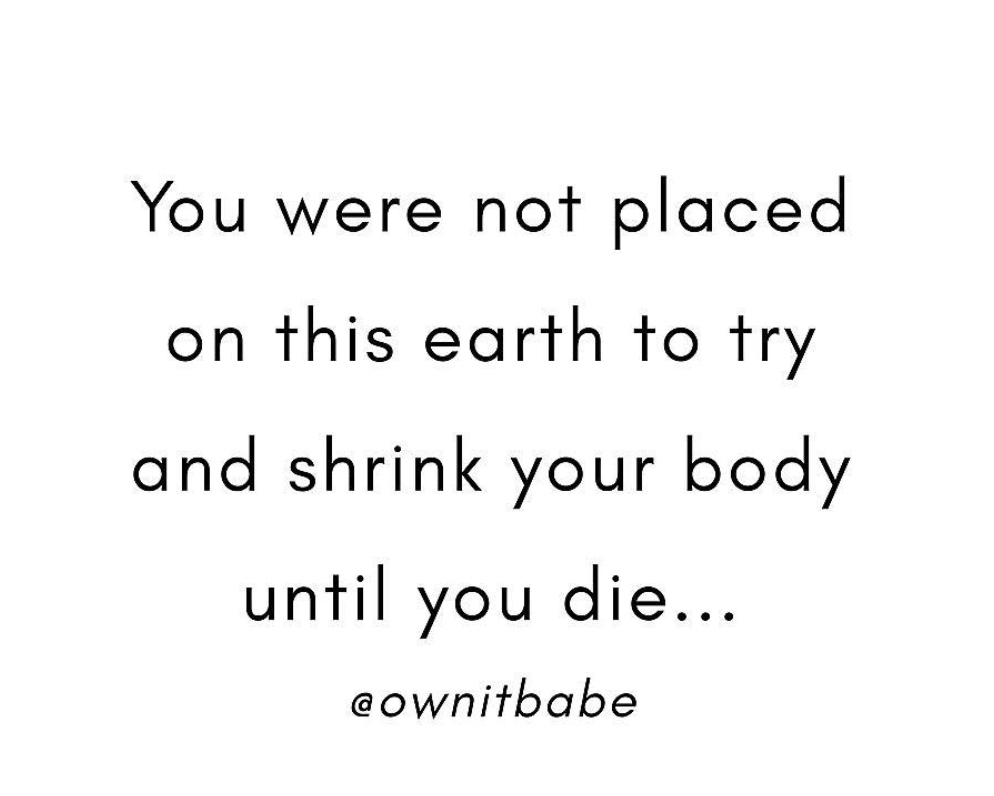
In addition, for many women who have worked hard to gain control over an eating disorder or unhealthy body image concerns, the hyper-focus on one’s body and weight during pregnancy, as well as the necessary pregnancy weight-gain, may trigger a relapse.
According to the National Eating Disorder Association, “the incessant counting, comparing, and measuring that happens during those nine months and beyond can tap into some of the very vulnerabilities that are linked to eating disorders and food and weight obsessions.”
Protective Measures to Take During Pregnancy
Have Realistic Expectations
Our bodies don’t miraculously transform back to their pre-baby versions once we give birth — this is a fact we just have to accept. That’s one of the reasons we tell readers that when packing their hospital bags, they should bring loose-fitting and/or maternity clothes to wear home, as they’ll still look about 6 months (give or take) pregnant. Understand that this is normal and healthy. Rather than focusing on appearance, Michelle tells her patients to focus on how they feel instead.
Change your Wardrobe
Moms, again, you aren’t going to magically fit into your pre-baby wardrobe after delivery. It takes months for your body to return to some form of normalcy, if ever.
You will likely go through an awkward period of not knowing what to wear. Meg remembers walking into a department store about three months after delivering and having NO idea what she needed, wanted or what would even fit. When an associate asked her what she was looking for, she replied, “I don’t even know anymore.”
While investing in pieces that you see as temporary might not feel like a great use of money, it’s super important to have some nice things to wear that make you feel comfortable and confident.
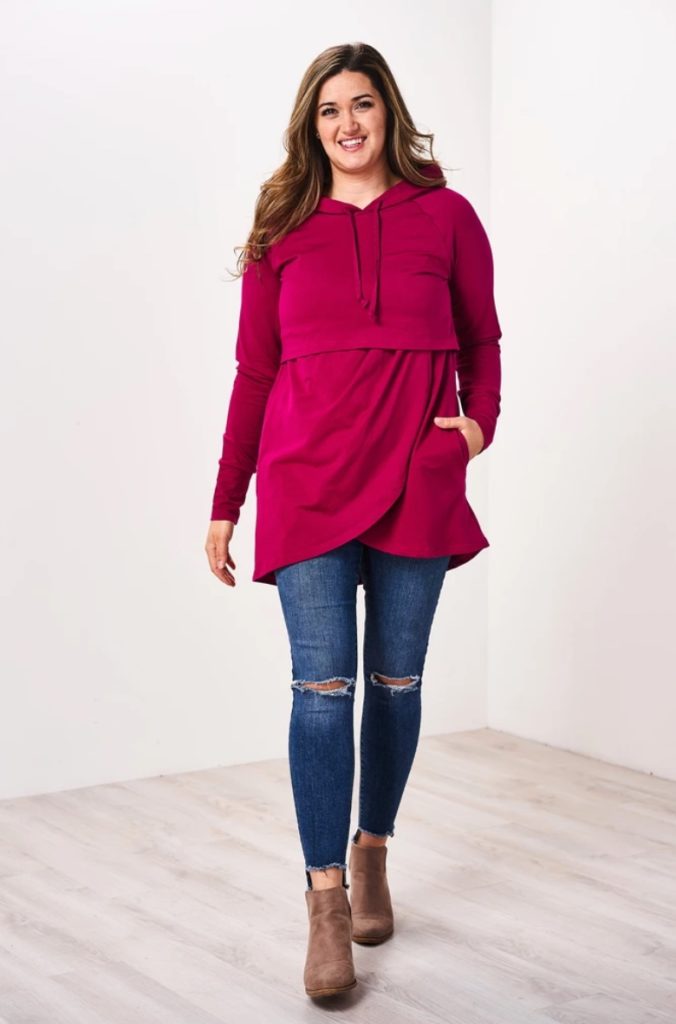
It’s okay to buy some new maternity and nursing clothes, or loose and flowy clothing that flatters your body.
Our guide to nursing wear includes many economical pieces for the postpartum time period.
Have fun with this! Michelle encourages women to forget about their pre-pregnancy clothes (buh bye jeans, hello maxi dresses and elastic band pants).
She also suggests doing something fun and exciting — like Rent the Runway — so you can consistently change up your pregnancy and post-pregnancy wardrobe (and always have stylish, new clothes that fit you well) without having to actually commit to buying anything.
Mindfulness Activities
If you find yourself so preoccupied with your weight gain (or fear about not being able to lose the weight after you have the baby), try some deep breathing techniques and mindfulness exercises. Apps like Calm, Headspace and MamaZen are great for this. Journaling and writing about your concerns may also be a good way to let them out.
Speak Up
I swear, people are fascinated by pregnant women — it’s like we’re an alien species that humans can’t believe they get to see up close and in real life. When I was pregnant, I was shocked by the amount of complete strangers who found it totally acceptable to comment on or want to touch my round belly.
If people around you — friends, family, strangers, etc. — are constantly talking about or focused on your body and it’s making you uncomfortable, don’t be afraid to tell them to stop. Michelle encourages women to simply say, “Please stop making comments about my body.”
Ask for Help
If these tips aren’t working for you and you are still worried about how you might feel about your body after you give birth, don’t be ashamed to seek professional help. Being proactive now will help you (and your baby) tenfold in the long run.
How to Love, Honor and Appreciate your Post-Pregnancy Body
You’ve had your baby and are struggling with feeling confident, comfortable and happy in your new body. It’s okay — remember that you’re not alone, and it’s truly not your fault you feel this way. But it is your responsibility — for you and your baby — to take the necessary steps to feel better.
The following tips, many of which come from our expert, Michelle, can help you begin to love, honor and respect your new body today.
Ditch the scale.
Michelle tells all her clients to throw away the scale. “The only reason you need a scale is to weigh luggage,” she says. “And no one’s going anywhere these days anyway!” Your medical provider will weigh you at your postnatal visits, and if there’s a problem, he/she will tell you.
Stop body checking.
“Cover up the mirror if you have to,” urges Michelle. Spending time in front of the mirror judging and berating yourself is a huge waste of time and energy.
Toss out the magazines.
Open any magazine and you’ll see distorted and unrealistic presentations of women. Michelle wants people to keep in mind that celebrities have access to services, such as fitness trainers, in-home chefs, healthy meal delivery, round-the-clock childcare etc., that the average person doesn’t.
It’s not helpful or fair to compare yourself to them and feel badly that your postpartum body doesn’t look like theirs. Not to mention, they also may be doing things to lose weight that aren’t healthy — skipping meals, taking diet pills, etc. If you want to change your body, do it to be healthier, feel stronger, and have a better mindset mentally and physically. “Skinny doesn’t equal healthy,” reminds Michelle.
Quit the Social Media Comparison Game (or just quit social media!).
Social media is a tricky platform that really complicates the issue: on the one hand, many moms and influencers claim to portray a more “realistic” representation of motherhood and of what the postpartum body looks like.
As women share their postpartum journey, Instagram, for instance, becomes a space where women can relate, feel less alone in their struggles, and build a strong sense of community with fellow new moms. But on the other hand, it can be difficult to differentiate sponsored content from “regular” content, and the “realistic” portrayal of motherhood is still often curated, filtered and beautified. Not to mention, in most cases, it doesn’t quite reflect the experience most of us have in those early days/weeks/months of postpartum, which is normal — just like pregnancy, every mom’s postpartum journey is unique.
As such, a search for connection that relies so heavily on pictures is a slippery slope towards yet another pervasive and damaging game of comparison that sets women up to once again feel badly about themselves and their postpartum bodies — this time with “real” women whom you think are sharing their “real” and “raw” pregnancy and postpartum journey.
Remember… social media, these days, is often just another advertising platform that reaches directly in your living room, while you are nursing your baby or trying to take a nap. You don’t know what really goes on behind those filtered, “trying not to look posed, but posed” images. That mama may also be experiencing some negative feelings about her changes, but may be putting on a face for the camera and the sake of her grid.
Talk to yourself the way you’d want your child to talk to him/herself.
Here’s a good piece of advice from an article in the NYT: “If you ever berate yourself, stop and ask whether you would want your child to speak to herself that way. Use your relationship with your body image as an indicator that you may need to learn how to be less critical and more patient with yourself and others.”
Switch your frame of mind.
When you find yourself feeling upset about or ashamed of your body, do your best to try to change your thinking.
Your belly is larger because you brought a baby into the world — that’s a superpower, mama! The marks on your skin — stretch marks, dark spots, etc. — those are badges of honor you can wear proudly; you did the hard work of growing and birthing a baby. You’re incredible.
“Yes baby.”
“It’s so soft and squishy.”
“I love that about it, don’t you?”
“Yeah it’s so cuddly”
“Do you know why I love my tummy the most though?”
“Why?”
“Because it grew you my darling.”
— via IG @roro_the_bopo_babe
Letters of gratitude to your body.
Research shows that the exercise of writing letters of thanks and gratitude to your body may help you feel more compassionate and loving towards your body and all its functions.
Being present in the moment.
When your negative self body image prevents you from doing the things you normally would, or want to do — such as meeting a friend for lunch or going on a date with your husband — because you’re uncomfortable with the way you look, this is a red flag. It’s important to continue to live your life no matter what you think about your body. Michelle has her clients repeat the following mantra to themselves: “I will not let my feelings about my body stop me from enjoying my life.” I encourage you to try it also. Not to mention, going out there and talking to your friends may be a great way to realize you are not the only one going through this.
Health first.
When you do start up with an exercise or nutrition program, make sure to focus on health — not weight loss — and set healthy and realistic goals for yourself. Michelle urges her clients not to join programs that advocate being thin or cutting calories, but rather supportive programs that promote a healthy, balanced lifestyle.
Also, if you’ve had any abdominal separation (diastasis recti), you’ll want to check with your doctor before beginning a program, and seek the help of a physical therapist or find an exercise program that’s well versed in the unique needs of postpartum women. Several moms I know have had positive experiences with the MUTU System, Every Mother and the Bloom Method.
Seek professional help.
If you are struggling to manage your negative feelings about your body and it’s preventing you from caring for yourself, your baby and living your life, it’s time to seek professional help from a therapist and/or a dietician well-versed in postpartum health and body image concerns. Postpartum Support International is a great way to find a therapist in your area trained in maternal mental health.
Bottom Line
Though it may feel challenging at first — and even if you have to fake it ‘til you make it — the more you are able to practice self-love and acceptance, the more likely you will be to eventually really, truly believe in your worth and feel proud of yourself and your body.
I encourage you to offer yourself as much grace, respect, love and appreciation as you would your best friend. After all, your body has just done a miraculous thing: it has literally grown an entire human being all from a single cell. How amazing! Take a minute to let that sink in. Feel proud of yourself, and your strong, incredible body — look at all the things it can do.
So though you may not feel your best right now, please offer yourself compassion — in fact, go ahead and mother yourself the same way you mother your new baby — and know that just as our lives evolve, so too do our our bodies. From pre- to post-pregnancy, your body has undergone an incredible evolution, and it will continue to transform as your life moves on.
Do your best to accept and honor your body exactly where it is today. You have all the permission in the world to let the shame and negative feelings go… you don’t need them. Focus instead on your health and wellbeing, and that new bundle of joy that you created.
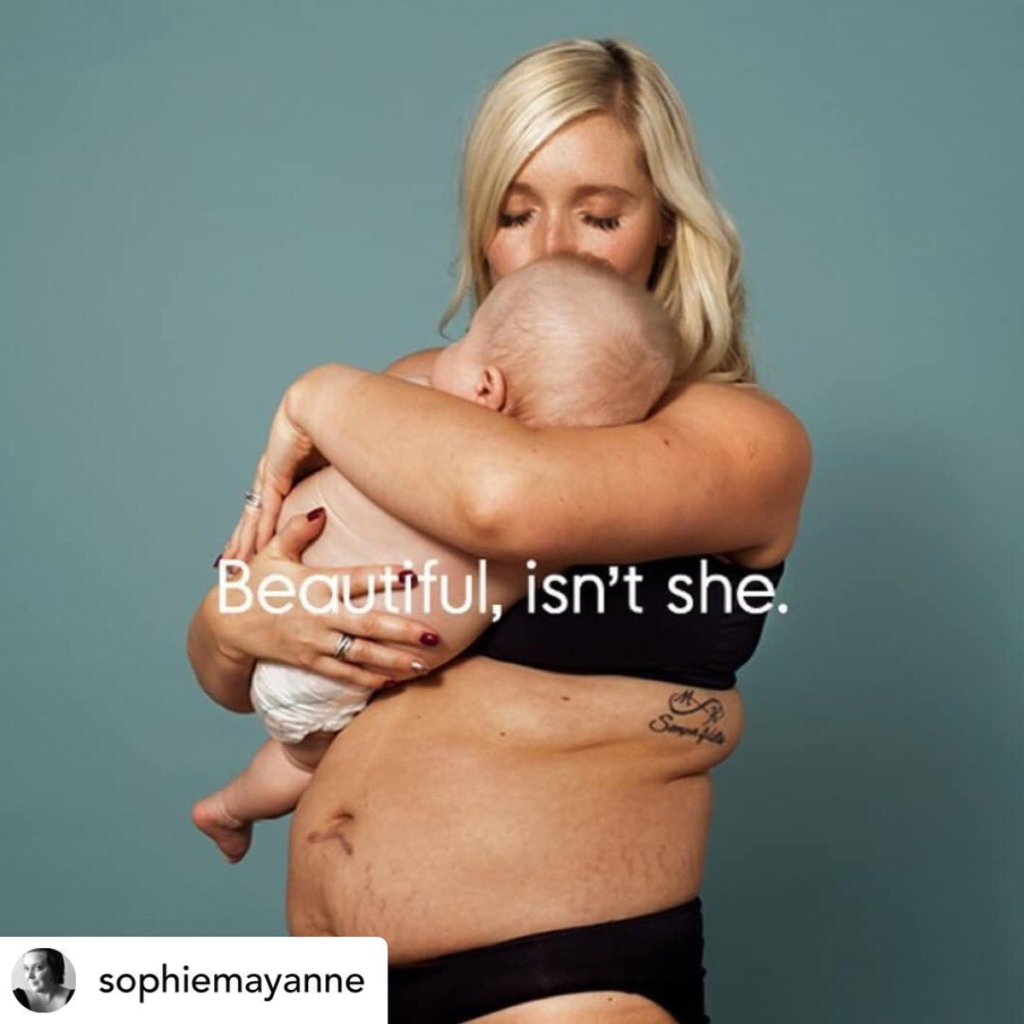
Post-Pregnancy Body Image Resources
Is that Mom in the Mirror Really Me? — New York Times
Postpartum Body Image Issue: How to Feel Better in Your Body Today — Crystal Kargas Nutrition
3 Timely Tips to Challenge Your Postpartum Body Shame — Carla Korn, LMFT
Predictors of Mothers’ Postpartum Body Dissatisfaction — Women Health. 2009 Sep; 49(6): 491–504. doi: 10.1080/03630240903423998
Pregnancy and Body Image — Office on Women’s Health
Your Body Isn’t The Same After Baby, and That’s Okay — The Every Mom
What Moms Need to Know About Postpartum Eating Disorders — Healthline
Hi! I wonder if you have heard of the Middrift project? V relevant. https://www.middriftmovement.com/
Thank you so much for sharing this resource!!
My body isn’t dramatically different after two kids but definitely not fitting into the same clothes as before. I exercise, eat healthy (and unhealthy too!), and my husband finds me sexy even when barely showered and wearing my new usual uniform of black leggings, shelf bra tank, and some random shirt. So last night I ditched 20+ dresses I’ve had for decades that I don’t fit in or look good in anymore. If my partner finds me hot for me, then what do I care what others who don’t see me everyday think?
Oh I love this SO MUCH!!! Thanks for sharing this, Bonnie.
thank you so much for writing an article about this! i struggled with an eating disorder before i got pregnant and was in therapy while pregnant, which really helped. although i am in remission now and my daughter is 2 years old, those negative feelings and thoughts still pop up every once in a while. i have learned that they will never truly go away but that you learn to ignore or counter them with more positive thoughts. i know more women struggle with this than we/they realize and it helps to shed light on it and to not be ashamed to seek out help. thank you!
Hi Jen! Thank you so much for sharing this. It sounds like you’ve done a lot of great work to get to where you are — that’s so inspirational to so many. Your outlook is right on – those thoughts may never go away, but I love you’ve learned productive ways to manage them. So amazing. Thank YOU for sharing. xo
I wish people would stop repeating the breastfeeding equals weight loss myth. It’s just not true for a lot of people (some hold onto the weight until weaning) and adds further pressure to an already complicated issue.
100 percent.
For me, urinary incontinence caused me huge body shame after my daughter’s birth. I went from not knowing what a poise pad was to needing the giant ones everyday. It was/is embarrassing to not have control of simple function. The incontinence made me want to give up a lot of physical activities. I’m glad for articles on your website and others because I have been getting help from a physical therapist. It is hard to talk about it but it effects me everyday and I’m told a lot of other women.
Also, I’ve been sharing with anyone around pregnant women. Ask the doctor to show you your pelvic floor muscles during an ultrasound so you can see if you are doing kegels correctly. My physical therapist uses one to see how strong the muscles are and before going to her I wasn’t doing kegels correctly.
While I do genuinely appreciate articles like this, I feel a bit shamed for wanting to get my body back to pre-baby. It feels like this is saying I should just accept what it is and move on, but there ARE moments that I really miss my old body and want to work on it and I’d love to hear that that’s ok too.
Thank you so much for this extremely thoughtful comment, Em. You’re ABSOLUTELY right. Well said — there’s definitely no shame in wanting to work on getting back in shape. Thank you for this good reminder.
I’m 18 months past giving birth, but my almost 10 lb child left my shorter body very different, and it is difficult to try to move past. While I appreciate these articles, and I try to follow advice and help myself, sometimes what I think would be great would be some sort of mother to mother help. It took me 30 yrs to figure out what outfits looked ‘good’ or made me feel good about myself. I am not good at all at knowing how to dress my body. Is there some sort of company, app, support group, anything that has fashion-smart mothers helping those figure out their new body? This means for tall, plus size, petite, those of us who wear L to XL yet have the chest of a Small… does something like this exist? If anyone wants to run with this business model – I would happily be your very first client.
Brilliant idea. You’re absolutely right — this would be truly amazing.
[…] one of the best ways to gain confidence after you’ve given birth to a precious baby is to learn to love your body. Your body has done so much for you to grow, birth, and continue to feed and nourish your new baby. […]
[…] going back home I handed Kevo the child and stood in front of our bedroom mirror naked. This was my new reality. I was now a mother and I had to figure out the kind of mother I wanted to be. I as still a wife. […]
I appreciate this article. Still, it’s hard to see myself as pretty now.
I gained 45kg during pregnancy despite exercising and having a good diet. My body blew out, my abdominal muscles separated to well over 2 hands width, and I’m trying — still 2 years later– to lose the baby weight and fix my abdominals.
For me, the hardest is:
1) SEXUAL SELF IMAGE: I really struggle to enjoy sex and sexual things. I am sort of absent from it, even when I’m being intimate. And alone, I can’t seem to allow myself to enjoy it.
2) BODY FUNCTION: I have incontinence challenges and haemorrhoids too. I feel yucky.
I know it sounds bleak, but I do feel my postpartum depression has definitely lifted, though.
I guess I feel sad that I’m not my previous body. I’ve never been bigger than a size 10 (AU).
:/
Thank you so much for sharing this. Please know you are definitely not alone. So, SO many of us can relate to everything you’ve mentioned here. I think it’s so important for us to express these feelings and talk about it with one another. Hugs.